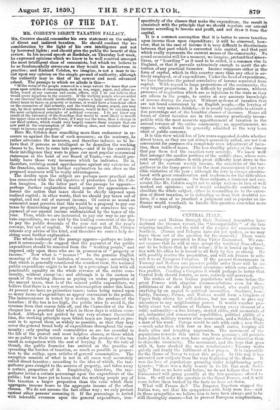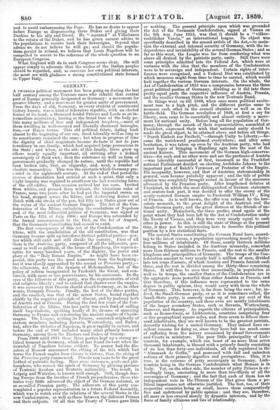CENTRAL ITALY.
TtuCANY and Modena through their National Assemblies have declared the thrones vacant, the "incompatibility" of the late reigning families, and the wish of the peoples for annexation to• Sardinia. (Parma and Bologna have not yet spoken, so we may leave them out of the question for the moment.) These votes- will be formally he to King Victor Emmanuel. We can- not suppose that he will at once accept the territory thus offered, nor do we believe that he will refuse ; if ho is bound up by trea- ties with his allies he is bound to all Italy by ties as strong. He• will possibly receive the proposition, and will ask France to sub- mit it to an European Congress. If the present Governments in Tuscany and Modena can preserve public order there will be no . necessity even for the provisional acceptance which some authori- ties predict. Pending a Congress it would perhaps be better that Central Italy should remain, as now, entirely self-governed. The wishes of these Italian populations will come before the great Powers with singular recommendations even for those- politicians of the old high and dry school, who could justify anything by an appeal to political necessities. Sardinia, Lom- bardy, Tuscany, Parma, and Modena would form a kingdom of Upper Italy strong for self-defence, but too small to give any uneasiness to any neighbouring power. It would number pro- bably about ten millions of Italians having every element of a noble nationality—a fine history, storied cities, rich memorials of art, industrial and commercial capabilities, political ability of a high order, military renown of no mean rank, and a Soldier-King, a man of his word. Europe would be safe with such a new State —much safer than with four or five small states, keeping old feuds alive and tempting aggression. The movement of the populations towards this union has been genuine ; old patriots,. have joined in it, new men have sought no other distinction than to share the unanimity. The movement, and the hope that goes: with it, have checked the mere revolutionist ; Tuscany waits quietly and firmly the fulfilment of her prayer. It is impossible for the House of Savoy to reject this prayer. In this way it has attracted new subjects from the very beginning of the House. It won the love of populations groaning under neighbouring petty tyrants; "there was a daily beauty in its life that made theirs. ugly." But as we have said before, we do not believe that Victor Emmannuel will grasp greedily at the fair provinces offered to him. He will refer the question to the Great Powers, and it will come before them backed by the facts we have set down. What will France do ? The Emperor Napoleon stopped the. Italian war, not that his sympathies with Italy were less—and in those sympathies we believe him to have been always and to be still thoroughly sincere—but to prevent European complications,
and to avoid embarrassing the Pope. He has no desire to appear before Europe as dispossessing three Dukes and giving their Duchies to his ally and friend. He " assented " at Villafranca to the return of the Dukes, and he has given earnest advice to the populations to receive back their Sovereigns. Beyond that advice we do not believe he will go ; and should the popula- tions persist in refusal, we believe that Louis Napoleon will be compelled to assent to the reference of the whole question to an European Congress. What England will do in such Congress seems clear. She will appear simply to advocate that the wishes of the Italian peoples should be regarded, and, as concerns her own political interests, she must see with gladness a strong constitutional state formed in Upper Italy.



























 Previous page
Previous page